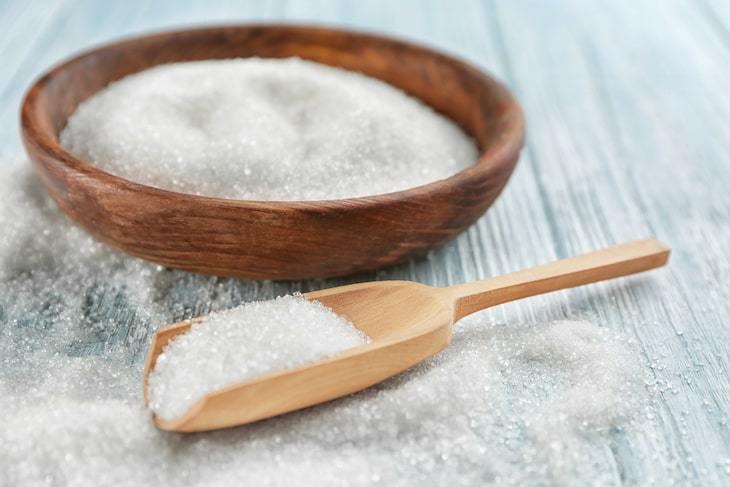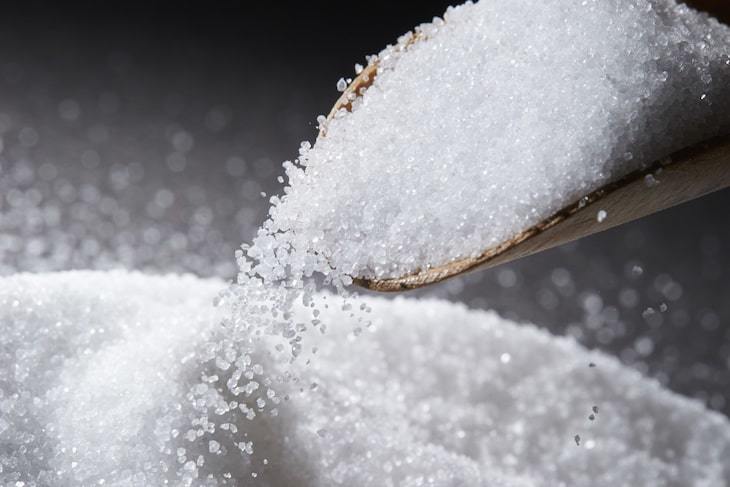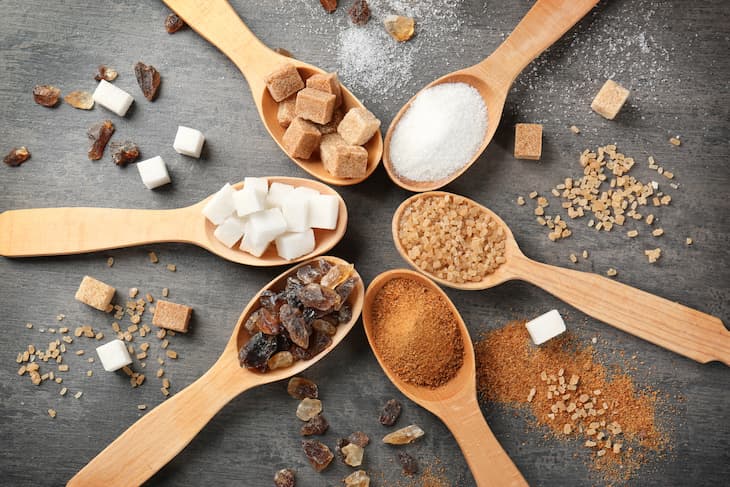What Is Allulose and Is It Keto?

Low carb sweeteners have become a household necessity for many of us following a Keto diet. And while there are some good ones out there, there’s a new sugar substitute on the block that has the potential to blow the others away.
This one is actually a form of sugar called allulose.
What makes allulose stand out? In addition to looking, tasting, and caramelizing like sugar, it actually has some very exciting health benefits.
So not only can it help with that sweet craving, it can help you reach your wellness goals too.
Let’s take a closer look at this new sugar substitute. But first, we’ll answer the question that may be on your mind…
Is Allulose Keto?
Yes, we’re happy to report that allulose is fine to eat on a Keto diet. We’ll get into some of the science that backs this up, as well as everything else you need to know to decide if this sweetener is right for you.
What is Allulose?
Allulose has a chemical structure similar to other sugars. It is a monosaccharide – a simple sugar – that bakes, freezes, and tastes very similar to regular sugar, but has only about 1/10th the calories.
Allulose is considered a “rare” sugar, meaning it’s found naturally in only a few foods, such as maple syrup, figs, raisins, and jackfruit. Manufacturers can also use enzymes to convert fructose from corn into allulose.
This sweetener has actually been around for a while. Allulose earned Generally Recognized as Safe (GRAS) status, according to the U.S. Food and Drug Administration (FDA), in 2012. (1)
So why haven’t we heard more about allulose before now?
In April 2019 the FDA announced that it was no longer necessary to include allulose in the “Total Sugars” and “Added Sugars” listed on a product’s nutrition label. (2) It’s important to note that allulose must still be counted in the Total Carbohydrates section of the label.
This is a big deal for manufacturers, who now have a greater incentive to include allulose in their products. They can produce better-tasting shelf-stable items and advertise that they contain no (or low) sugar.
This change by the FDA does require that consumers become even more savvy when they read nutrition labels.
For example, you may be in the habit of calculating net carbs by taking the label’s total carb count and subtracting grams of fiber and sugar alcohols.
To get an accurate net carb count now, you’ll also want to subtract grams of allulose from the total carb count. Like sugar alcohols and fiber, allulose is a “non-impact carb” – it does not raise blood sugar and is not metabolized by the body for energy. (3)
Health Benefits of Allulose

This is where allulose really stands out from the crowd of sugar substitutes.
The research on allulose is fairly new, and a lot of the existing studies were done using animal models. So while more studies are needed, particularly with human subjects, the results so far are very encouraging.
One of the main health benefits associated with allulose is its ability to help maintain healthy blood sugar levels.
One 2008 study found that ingesting 5 grams of allulose along with carbohydrates reduced the following rise in blood sugar. (4) They also found that eating allulose alone did not cause a lowering of blood sugar, which is important for those who tend toward hypoglycemia.
These blood-sugar stabilizing effects results were also found in a 2010 follow-up study with borderline diabetics, and in a 2018 study with type-2 diabetics. (5, 6)
Other promising benefits of allulose include body fat reduction and increased metabolism. One 2018 study showed that consuming allulose led to greater reductions in body fat after 12 weeks, and higher doses (7g twice a day, versus 4g twice a day) led to greater reductions. (7)
Animal studies have shown these and other potential benefits, including favorable effects on the microbiome, anti-inflammatory properties, and reduced fatty liver. (8, 9)
Allulose Side Effects
The available research so far has found few problems with allulose, and only at high doses.
One study of 30 subjects found that large amounts of allulose can cause gastrointestinal symptoms, such as nausea, bloating, diarrhea, and abdominal pain. (10)
The researchers concluded that these side effects of allulose can be avoided by staying below a single dose of 0.4 grams per kilogram of body weight and a total daily intake 0.9 grams per kilogram of body weight.
This means that an adult weighing 150 lb. (68 kg) can probably avoid side effects by consuming less than 27 grams in a single dose (6.8 teaspoons) and a total of 61 grams per day (15.3 teaspoons).
What about long-term side effects? Research on humans is lacking in this area, but animal studies have shown no harmful effects with long term use. (11, 12)
Allulose vs. Other Sweeteners
You might be wondering how some of the best keto sweeteners stack up against each other. Let’s take a look.
Allulose vs. Erythritol
Erythritol is a sugar alcohol that has no carbs or calories. It has become popular as a sugar substitute because, like allulose, it has no effect on blood sugar and is keto-friendly.
Where erythritol and allulose differ is in some of their baking properties and in their taste.
You can bake with both sweeteners, though erythritol is a bit less sweet – about 60% as sweet as sugar – compared to allulose, which is 70% as sweet.
You may also notice a “cooling” effect when you eat erythritol – almost as if you’ve tasted mint or menthol. This is not the case with allulose, which has a taste more similar to table sugar.
Erythritol doesn’t brown or caramelize the way allulose and regular sugar do, so it might not be the best sweetener to use for making a glaze or sprinkling it on top of cookies or muffins.
Both sweeteners have the potential to cause some gastrointestinal upset at high doses.

Allulose vs. Stevia
Stevia is a zero-calorie sweetener that is 150-200 times sweeter than sugar. This contrasts with allulose, which is only 70% as sweet as sugar. You’ll have to be careful not to overdo it when adding stevia to a recipe, while with allulose you will actually need to add a bit more.
Stevia can come as a powder or a liquid. Pure stevia extract powder can be quite expensive compared to allulose, but much smaller amounts are needed to replace sugar in recipes.
Both stevia and allulose boast health benefits ranging from reduced blood sugar to lower inflammation. Stevia also shows some promise as an antimicrobial, contributing to oral health and reduced plaque and gingivitis. (13)
Where stevia falters for some people is with its potential side effects and taste.
As a member of the ragweed family, stevia can trigger allergy symptoms for some users. Additionally, some research suggests that stevia can disrupt the hormonal system in humans. (14) Additionally, many people report a bitter aftertaste with stevia.
Allulose does not have these effects, but can cause some gastrointestinal upset at high doses.
Where to Buy Allulose
Allulose is growing in popularity, but it can still be hard to find in grocery stores. Currently, online retailers are your best bet for sourcing this sweetener.
You can buy allulose in pure form or mixed with other sweeteners, like stevia, monk fruit, or erythritol.
Some good pure allulose brands are It’s Just Allulose Sweetener and Wholesome Allulose. Pure allulose is 70% as sweet as sugar, so you would need 1⅓ cup of allulose to replace a cup of regular sugar in a recipe.
A blended brand to try is High Key Monk Fruit Stevia Erythritol & Allulose Blend. This brand measures cup-for-cup the same as sugar in recipes.
You’ll also see allulose showing up in low-carb and low-sugar products, such as some Quest bars.
Frequently Asked Questions (FAQ)
Q: Is allulose natural?
A: Allulose is found naturally in small amounts in some foods like maple syrup, figs, and raisins. Because the quantity found in nature is so small it is considered a “rare sugar”.
Q: How is allulose made?
A: Although some allulose is available by natural sources, this sweetener can also be manufactured. It’s made by using enzymes to convert fructose from corn into allulose.
Q: Is allulose gluten-free?
A: Yes, allulose is naturally gluten-free. Allulose is present in small amounts in wheat, but the allulose you buy in a store is generally manufactured from corn or extracted from sugar beets.
Q: Does allulose cause gas?
Allulose is quite well-tolerated, especially compared to some other low-carb sweeteners. Still, it can cause gastrointestinal symptoms at high doses.
One study showed that participants avoided side effects by staying below a single dose of 0.4 grams per kg. of body weight and a total daily intake of 0.9 grams per kg. of body weight. (15)
When the amount of allulose consumed surpassed these doses the subjects experienced side effects that included nausea, bloating, diarrhea, and abdominal pain.
Q: Does allulose raise blood sugar?
No, allulose does not raise blood sugar. In fact, one of hidden health benefits of allulose is its ability to help maintain healthy blood sugar levels.
One study showed that 5 g and 10 g doses of allulose did not raise blood glucose or insulin levels during an oral glucose tolerance test (OGTT). (16)
Allulose is absorbed by the small intestine and is excreted through the urine, essentially without being metabolized, or broken down. (17) Because it is not metabolized it does not increase blood sugar.
Is allulose healthy?
We think allulose is a healthy addition to any diet, especially as a substitute for high-glycemic sweeteners like sugar. It is also the perfect complement to a Keto diet, and provides a healthy outlet for the occasional (or not-so-occasional) sweet snack or dessert.
Yes, allulose is healthy! It tastes great, has some surprising health benefits, and very little downside at moderate doses.
Allulose Is Great for Keto

Allulose is one of our favorite sweeteners. And while more research is needed to confirm the health benefits, it is very promising for potential blood-sugar stabilizing and fat-burning effects.
Not only that, it is delicious with no bitter aftertaste, and it behaves a lot like regular sugar when you cook with it. Definitely give this sweetener a try!
